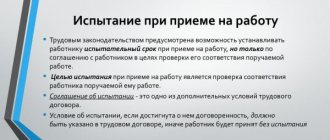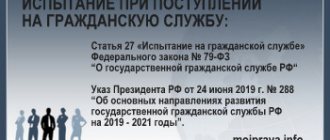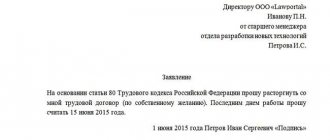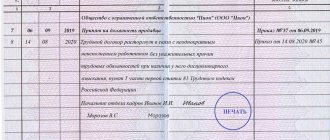Procedure for establishing the test
Establishing a probationary period is the right, but not the obligation, of the employer. The main purpose of such an event is to test the professional skills, knowledge and personal qualities of the applicant for their compliance with the interests of the company. At the same time, for the applicant, this is an opportunity to evaluate the content of the job, corporate culture, team and compare the impressions received with their expectations.
Most of the parameters of the procedure for establishing a probationary period are set out in Art. 70 Labor Code of the Russian Federation. It sets deadlines for checking an employee:
- No more than 3 months for all employees;
- Up to six months - for managers, chief accountants and their deputies;
- Up to 2 weeks – if a fixed-term contract is concluded for a period of 2 to 6 months;
- From 3 to 12 months – for civil servants.
The condition for assigning a probationary period is mandatory in the employment contract with the hired employee. If he refuses to undergo the verification period, and the employer insists on this, then the employment contract is not concluded, since no agreement has been reached on its essential point. The period allotted for checking a candidate for compliance does not include periods of his actual absence from work.
The Labor Code of the Russian Federation also contains a list of personnel for whom it is prohibited to establish a probationary period.
At the beginning of a relationship
Under some conditions, the probationary period is limited or not provided at all , which is regulated by Article 70 of the Labor Code.
Even despite the fact that a new employee is hired on a probationary basis, the formalization of labor relations takes place in the standard way :
- an employment contract (or form) is concluded between the employer and the new employee;
- the company issues an order to hire him for a new job (
and form); - The personnel department makes an appropriate entry in the work book .
The probationary period (that is, the test period) and its conditions (range of responsibilities, production rate, and so on) must be specified in the contract. If this is not the case, then the new employee is hired without testing . If the contract is not concluded, but the person is allowed to work, he is considered automatically hired. You can sign the contract and determine the conditions for admission (test) later.
If the trial period is not specified in the contract or there is no contract, then later, when concluding the contract, it can be entered there :
- with the permission of the employee;
- in the event that there is an additional agreement concluded before the employee began his duties, that is, he was actually hired.
Reasons for dismissal during the probationary period
The law does not limit in any way the possibilities for terminating the relationship between the company and the employee during the probationary period. As with other conditions of employment relations, dismissal can occur:
- At the initiative of the employee;
- By agreement between the participants in the labor relationship;
- At the initiative of the employer.
Often, separation occurs when the candidate did not meet the employer's expectations and, as a result, failed the test. This dismissal option also falls into the category of those carried out at the initiative of the employer (read more here: dismissal during a probationary period).
How to write an application correctly?
It is necessary to correctly compose the text of the resignation letter. It is concise and does not contain unnecessary information.
This is what must be in the application:
- in the upper right corner the name of the organization, full name and position of the director or head of the department and the employee who is resigning;
- in the center you must write the word “Statement”;
- below there should be a text with approximately the following content: “I ask you to dismiss me at your own request “__ ______ 20__”;
- everything is certified with a date and signature.
There is no need to attach any additional documents. The application is submitted to the head of the department or sent to the HR department. Since deadlines are tight, it is worth notifying responsible employees in advance of your intention to resign. It is worth noting that an employment contract can only be denounced at the initiative of the employee when he is on sick leave or on vacation.
How is work-off applied during dismissal during a probationary period?
There is no term in the legislation for working off ; it refers to the notice period for dismissal, enshrined in Art. 71 Labor Code of the Russian Federation. It establishes a standard period for informing about dismissal, which is used by both the employee and the employer - 2 weeks .
However, for the probationary period in this article there is a special rule that establishes a shorter warning period - 3 days . This is exactly how much work will be done upon separation during the probationary period. The calculation of the specified time period begins from the day following the date of writing the application or notifying the employee of the upcoming dismissal.
Processing at will
When dismissing on the initiative of an employee, he is obliged to notify the employer of the decision made at least 3 days before the date of departure. The reason for this behavior of the candidate may be the discrepancy between his expectations and reality regarding the content of the work, the behavior of the manager, or unacceptable requirements for his appearance or behavior in the team.
The care procedure will be as follows:
- Writing a letter of termination and submitting it to the employer 3 days before the last working date;
- Fulfillment of labor duties during the prescribed period of work;
- Issuing a dismissal order;
- Making entries in the work book and personal card;
- Calculation and issuance of documents on the last working day.
The specified working period allows the employer to find a replacement for the employee and transfer cases.
It should be taken into account that the employer may allow the employee not to work for 3 days , but to part with him immediately upon submitting the application.
Processing by agreement of the parties
In some cases, the parties to the employment relationship agree to terminate it based on mutual agreement. In this case, the working period may also not apply if both parties to the contract come to such a decision.
Stages of dismissal by agreement of the parties during the test:
- Negotiating the upcoming separation and agreeing on its terms;
- It is possible to write a statement (but not necessarily) about dismissal by agreement;
- Concluding an additional agreement on the terms of termination of relations;
- Issuance of an order for dismissal after service or without it, if there was such an agreement;
- Making entries in the work book and personal card;
- Calculation and issuance of documents on the last working day.
Dismissal by agreement is considered the “safest” for the employer, as it allows you to immediately resolve all existing disagreements between the parties.
The dismissal agreement has the opportunity to provide for any additional conditions of separation, including the amount of additional compensation, the absence of mutual claims, and additional obligations of non-disclosure of information. Thus, subsequently filing any claims is pointless, since the presence of the employee’s signature on the document will indicate his consent and personal will to fulfill all the agreed upon points.
Work in connection with the employer's decision
In addition to voluntary dismissal, there may be a need to get rid of an unsuitable candidate at the initiative of the employer. This scenario is possible in the following cases:
- The employee showed unsatisfactory test results;
- The employee committed a gross violation of his duties and was subject to disciplinary action in the form of dismissal.
A similar mechanism works here to provide the employee with a 3-day advance warning. The dismissal procedure will be as follows:
- Written notification to the employee of his upcoming departure;
- Obtaining his signature on the notice that he has been notified of the deadline for dismissal;
- Carrying out the transfer of cases over the next 3 days;
- Issuing an order to terminate the relationship;
- Making entries in the work book and personal card;
- Calculation and issuance of documents on the last working day.
In cases where the reason for dismissal was theft, absenteeism, or drunkenness at work, the employer should collect in advance all the documents that serve as evidence of the employee’s misconduct. Otherwise, there is a high probability that he will subsequently challenge the dismissal.
Do I need to work it out?
Do I need to work off my job if I decide to quit? This question interests not only subjects, but also permanent employees. Working off refers to the period of time that passes from the moment of notification of termination of the contract until the actual termination of the performance of professional duties.
Such a restriction applies not only to the worker, but also to the management of the organization. The issue of working out during a probationary period upon dismissal at the proposal of the subject is spelled out in Article 71 of the Labor Code of the Russian Federation.
The obligation to draw up a contract is provided for all workers. It does not matter whether they are accepted on a trial basis, on an ongoing basis or for a short-term basis.
When can an employee not work?
There are exceptions to the above examples when, due to certain circumstances, the employee does not need to perform his duties for the last 3 days before dismissal. This happens if at this time the employee:
- Sick;
- Is on vacation;
- He took the days off he was entitled to for donating blood.
However, this rule applies only if the employee wrote a statement of his own free will, since it is impossible to terminate the contract during these periods at the initiative of the employer.
In addition, there are cases when working out is not required based on the provisions of the Labor Code of the Russian Federation:
- Dismissal for health reasons due to the inability to continue working under existing conditions;
- Change of place of residence due to the transfer of a military spouse to another area;
- Dismissal to care for a seriously ill close relative;
- Employee pregnancy;
- Admission to a university makes it impossible to continue working;
- If the employee is raising a child under 14 years of age alone.
In all other cases, the rule of notice of dismissal, which was described above, applies.
When does dismissal occur without work?
However, it is possible to do without even three days of work . One day it is possible to resign by agreement of the parties - both during the probationary period and while on the staff of the organization. This right is specified in Art. 78 Labor Code of the Russian Federation. In addition, based on the content of Art. 70 of the Labor Code of the Russian Federation, it can be stated that even if there is a probationary period, you will be subject to laws, provisions of the Labor Code, regulations and labor law norms.
You can quit without work if you:
- You will be enrolled in a university or other educational institution and will no longer be able to continue working;
- Will you retire?;
- Violate labor laws or local acts of labor and collective agreements;
- Move to another place or region for work;
- You will be forced to go abroad to work in the direction;
- Forced to move to another area for medical reasons;
- You are caring for a child under 14 years of age, a disabled person or a sick family member;
- Are you a pensioner or a pregnant woman?;
- Are you a parent or guardian of a child under 14 years of age?.
Thus, rehearsal is not always necessary. You are obligated to notify your manager, but do this no later than a certain period of time - no, if you have a good reason for resigning as soon as possible, and even better - documents confirming this reason. Therefore, it all depends on you and your circumstances.
What payments are due upon dismissal?
During the probationary period, an employee is no different from other employees and must be accrued all amounts due for payment:
- Payment for actual time worked;
- Incentive amounts (additional payments, allowances);
- All compensation payments, including payment of unused vacation days;
- Severance pay if it is provided for by an individual agreement or local regulations of the company;
- Other payments specified in the company’s internal documents.
This must be done on the last working day and any infringement of the employee’s rights during the probationary period is unacceptable.
Is it possible to quit during the probationary period without three days of work?
The current regulations have established several special rules regarding the procedure for dismissing an employee while he is on probation. First of all, these rules relate to the duration of work. It will be only three days. At the same time, the length of the probationary period, which was previously established by the employer, in this case will not have any significance.
Despite such a short duration of work during the test, employees still often have questions about whether it is possible to resign urgently without working a single day. The best solution here would be to discuss this issue with the employer in advance. It is quite possible that the director does not have any particular objections to releasing the employee earlier than the deadline. In this case, the dismissal procedure can be completed in literally 1-2 days.
If the manager turns out to be against immediate dismissal, the employee will still have several ways to leave without three days of work. In particular, we are talking about an employee being on vacation or sick leave. As is known, in this case the director will not have the legal right to unilaterally dismiss an employee.
However, the subordinate himself will retain this opportunity. To implement this, an employee on vacation or sick leave will need to draw up a standard resignation letter addressed to his own boss. In this case, the working period will coincide with the time you are on vacation or sick leave. Upon exit, the employee will be immediately dismissed by the employer.









